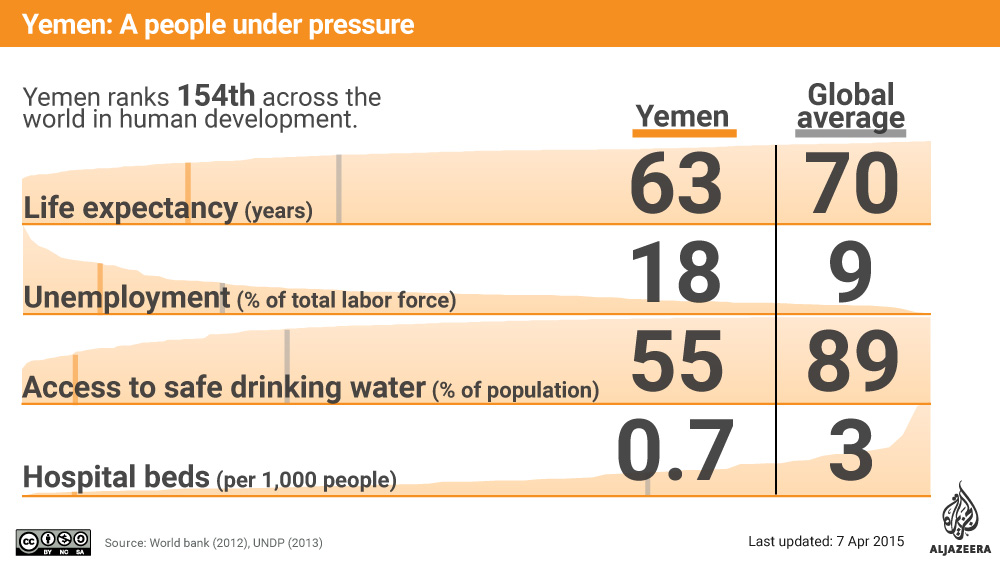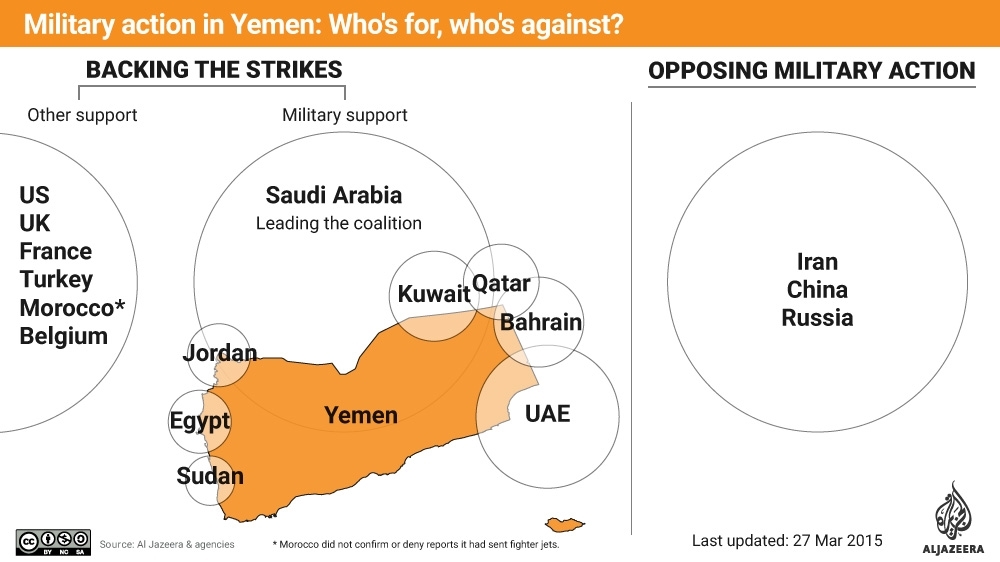Intense fighting reported in Yemen’s Aden
Medical supplies reach southern port city as Saudi-led coalition jets continue to strike suspected Houthi positions.

Saudi-led air strikes against suspected Houthi fighters in Yemen have continued for the 15th day, with intense fighting occurring in the southern city of Aden, where rockets have reportedly landed on houses.
The World Health Organisation says at least 643 people have died and more than 2,200 have been injured in the Yemeni conflict since March 19.
Keep reading
list of 4 items‘Mama we’re dying’: Only able to hear her kids in Gaza in their final days
Europe pledges to boost aid to Sudan on unwelcome war anniversary
Birth, death, escape: Three women’s struggle through Sudan’s war
Tens of thousands of families have also been displaced and WHO has warned that the situation in the Arabian Peninsula nation is critical.
The fighting in Aden pits Houthi forces and their allies against local armed groups loyal to President Abd-Rabbu Mansour Hadi.
Saudi Arabia and its Gulf allies accuse Iran of arming the Houthi fighters but Iran denies the allegations.
In a speech on Thursday in Tehran, Iran’s President Hassan Rouhani called for an end to the air strikes in Yemen, saying countries in the region should work towards a political solution.
“A great nation like Yemen will not submit to bombing. Come, let us all think about ending war. Let us think about a ceasefire…Let us prepare to bring Yemenis to the negotiating table,” he said.
Medical supplies
Against this backdrop of escalating tensions, the first medical supplies have started arriving in Aden: the medical aid group Doctors Without Borders said they have made it to some of the city’s hospitals.
It said a boat carrying 2.5 tonnes of medicine had docked in Aden, the first shipment the group has delivered to the city since the fighting there escalated.
For its part, the International Committee of the Red Cross (ICRC) said that a surgical team also arrived by boat on Wednesday in Aden.
“It’s nearly catastrophic,” Marie Claire Feghali, ICRC’s spokesperson in Yemen, told Reuters news agency.

“Shops are closed, so people cannot get food, they cannot get water. There are still dead bodies in the street. Hospitals are extremely exhausted.”
The Saudi military spokesperson said on Wednesday the situation in Aden port was not safe and causing delays in the delivery of aid.
Against this backdrop, Iran’s state media announced on Wednesday the deployment of two warships to the Gulf of Aden as part of an anti-piracy mission.
Iran’s English-language state broadcaster Press TV quoted Rear Admiral Habibollah Sayyari as saying that the ships would be part of an anti-piracy campaign “safeguarding naval routes for vessels in the region”, rather than being directly related to the conflict in Yemen.
Zarif’s appeal
On the diplomatic front, Mohammad Javad Zarif, Iran’s foreign minister, said during a visit to Pakistan that the countries should work together to end the Yemen crisis.
“We need to work together to find a political solution,” he said as he arrived on Wednesday for a two-day visit to Islamabad.
“The people of Yemen should not have to face aerial bombardment,” he said, referring to air strikes by the Saudi-led coalition that started last month.
Zarif said he favoured a four-part plan to impose a ceasefire in Yemen, deliver humanitarian assistance and then establish a broad-based dialogue and finally a broad-based government.
He recommended this to Pakistani, Turkish and Omani leaders, he said.
However, in an interview to PBS NewsHour, John Kerry, the US secretary of state, accused Iran of providing support to Houthi forces.
Kerry’s comments followed confirmation by the US administration that it was expediting arms shipments to Saudi Arabia and subsequent remarks by Ash Carter, the US defence secretary, that the conflict had provided al-Qaeda with an “opportunity” to gain new territory in Yemen.
